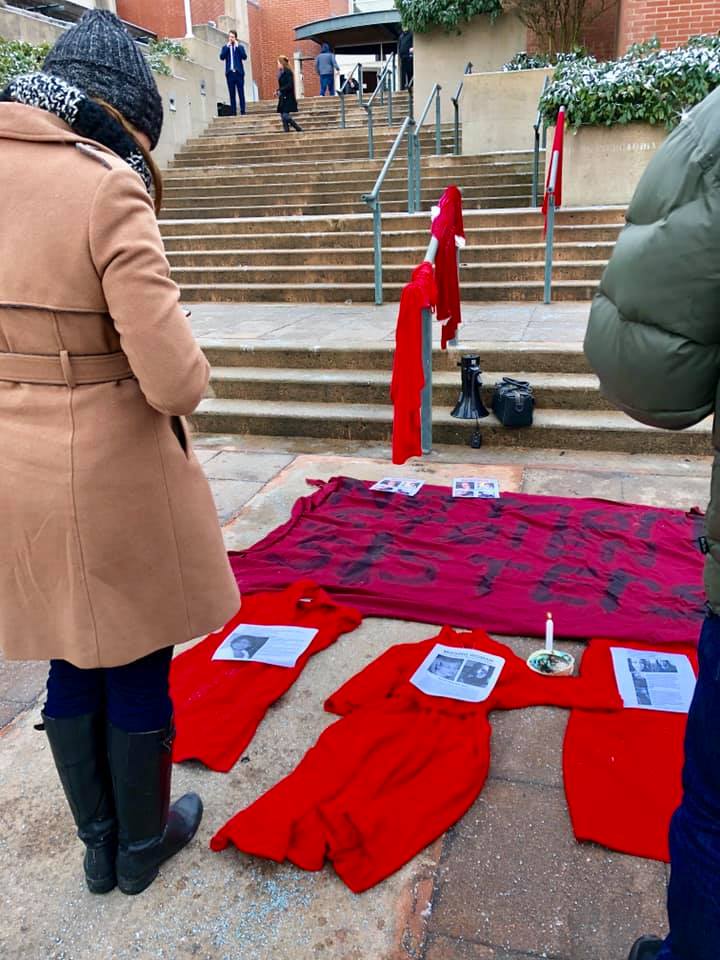Sagmoen Back in Court on Monday
Battered Women’s Support Services (BWSS) will be on-site in Vernon, BC Monday, September 9th, 2019 at 8:30 am for the latest trial of serial attacker of women, Curtis Sagmoen. In his latest trial, Sagmoen stands accused of eight offenses including uttering threats, pointing a firearm, and use of a firearm committing an indictable offense. Read the press release here.
Earlier this year, we joined advocates Jody Leon and Ida Manuel at the Provincial Court in Port Coquitlam at Sagmoens trial, rallying for Justice.
Sagmoen has a long history of hiring sex workers, usually Indigenous women, to work at his properties both in the Vancouver area and near Vernon then viciously assaulting them, resulting in an extensive criminal history including brutal attacks with a hammer, guns, and using a spike belt to slash tires and prevent a woman from fleeing from his property. BWSS created a timeline of Sagmoen’s activity since 2002, illustrating his ongoing history of violence against women.

She Was A “Known Surrey Prostitute with an Extensive Criminal Record”
Brooklyn Fowler, Thrive Program Service Co-ordinator at BWSS will be in Vernon Monday morning. They have written about Sagmeon and the biases within Canadian systems that make gender-based violence with impunity possible.
“On my second shift working relief at a sex worker resource centre in the Vancouver area, I was stopped by a program participant named Arlene. Arlene is an older Indigenous woman with a kind, sincere smile; she knows everyone and she always sits in the same chair. She stopped me to introduce herself and we chatted for a while about the centre, her grown-up children, and that night’s dinner menu. After around ten minutes of casual chit chat about our families, her face suddenly fell and she said to me “I haven’t seen my sister in a long, long time. She was one of the ones they found on the serial killer’s farm.”
That was as jarring for me as if all the windows around us had suddenly smashed. Like most of us, I am very familiar with that case, however, my experience with it was purely academic. I had read and talked about it at length, but suddenly my safe and comfortable distance from the reality of it was shattered as I hugged a woman now heaving with sobs.
In 2018 Battered Women’s Support Services became involved with the Curtis Sagmoen case, a case which bears many similarities to the previous serial killer case. Sagmoen has a many year history of hiring sex workers, usually Indigenous women, to work at his properties both in the Vancouver area and near Vernon and viciously assaulting them, resulting in an extensive criminal history including brutal attacks with a hammer, guns, and using a spike belt to slash tires and prevent a woman from fleeing from his property. Then, in late 2017, RCMP investigators found the remains of a missing 18-year-old girl named Traci Genereaux on his family’s property outside of Vernon.
Yet, despite a lengthy criminal history of violence against women, the RCMP have continually abetted his violence by failing to properly investigate, stigmatizing the victims and survivors, and displaying bias against them based on their occupations, race, and gender. In 2013 the Maple Ridge RCMP described the woman Sagmoen viciously beat a woman with a hammer, as “a known Surrey prostitute with an extensive criminal record.”
The word prostitute is an ugly word. It is a power-laden word hurled at women working in sex economies that robs them of their own power over their bodies and labour. While some sex workers have reclaimed the word on their own terms, it is generally used only to degrade, objectify and dehumanize sex working women. In 1978 Carol Leigh coined the term “sex worker” to more accurately describe the highly skilled customer service work that takes place within sex economies.
The use of the slur “prostitute” by the RCMP to describe victims of crime makes agonizingly clear who is and who is not seen as deserving of basic protection from the state. The RCMP’s mandate is to ensure the safety of all people in the territories we call Canada. Yet, how can they claim this to be their mandate when they are abdicating responsibility for properly investigating attacks on Indigenous women, sex workers, and women living in poverty? How can we feel safe or protected by a police force, or within a system that clearly demonstrates its belief that some people are not deserving of protection?
That bias is hardly committed solely by RCMP or police broadly speaking, but it is up to each one of us to commit to undoing it because of the violence against women that this bias causes and excuses. It is all of our responsibility to commit to properly interrogate and dismantle racist bias, anti-sex worker bias, and misogynist bias.
Violence against women on the basis of their gender does not take place in a vacuum. It is not an isolated phenomenon that takes place between two people. Rather, it is a social phenomenon that is made possible by widespread de-valuing of women and feminized people. This de-valuating takes place when we tell jokes degrading sex workers, use violent language about women, or assume specific roles and behaviors based on gender. These and many other social forces conspire together to teach us that women are “supposed” to be obedient, to sexually gratify men on demand, yet simultaneously to be modest and nurturing”.




